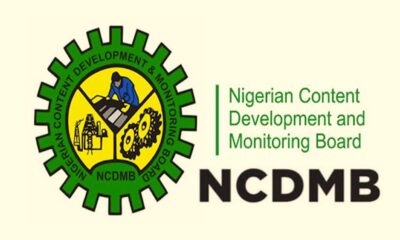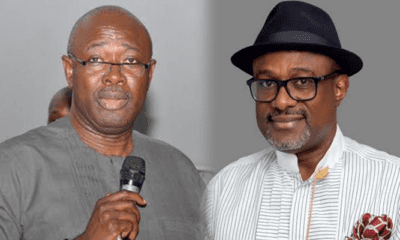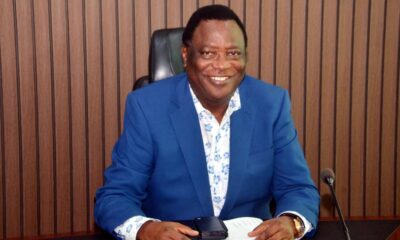Business
NCDMB assures NAICOM of implementation of MoU to boost patronage of local insurance firms
The Nigerian Content Development and Monitoring Board (NCDMB) has assured the National Insurance Commission (NAICOM) of its willingness to implement the insurance services regulations jointly issued by both agencies in June 2022, to get Nigerian oil and gas companies to patronize local insurance firms and retain spending in the economy.
The Executive Secretary of the NCDMB, Engr. Felix Omatsola Ogbe on Tuesday gave this assurance when he visited the Chief Executive of the Nigerian Upstream Petroleum Regulatory Commission (NUPRC), Engr. Gbenga Komolafe and the Commissioner for Insurance of the National Insurance Commission (NAICOM), Mr. Sunday Olorundare Thomas at their respective offices in Abuja.
The visit by the new NCDMB boss was aimed at familiarising himself with chief executives of institutions that are represented on the NCDMB’s Governing Council as well as exploring areas of collaboration.
In his remarks, the Executive Secretary conveyed the willingness of the NCDMB to deepen its partnership with key agencies of the Federal Government to achieve the economic aspirations of President Bola Tinubu administration’s Renewed Hope Agenda, adding that cooperation and teamwork were key to accomplishing any noble objective.
He promised that NCDMB would work closely with NAICOM to review and operationalise the insurance services regulations jointly issued by both agencies in June 2022, to get Nigerian oil and gas companies to patronize local insurance firms and retain spending in the economy.
The Commissioner for Insurance of the National Insurance Commission (NAICOM), Mr. Sunday Olorundare Thomas congratulated the Executive Secretary on his appointment, noting that he would be building on the solid foundation laid by his predecessors.
He described NCDMB as a formidable institution and commended the founding fathers of the Board for their foresight in creating such an important agency. He also lauded the former Executive Secretaries of the NCDMB for their innovative projects and achievements while in office that added value to the economy.
The Commissioner for Insurance described insurance as the oxygen of business operations.
He expressed concern that the insurance services regulations that were signed by the commission and NCDMB were yet to be implemented. He requested the Executive Secretary to address the challenges, hinting that implementing the regulations would bring the needed changes in the insurance subsector of the oil and gas industry before being extended to other key sectors of the economy.
At the NUPRC, the Executive Secretary reiterated the need for teamwork and partnership amongst various agencies under the Ministry of Petroleum Resources, to sustain the growth of the Nigerian oil and gas industry. He hinted that collaboration would create an enabling environment that would attract investments and new projects into the sector, helping to create employment opportunities for youths and address insecurity in the polity.
While noting that Local Content development would be stunted if projects and investments in the oil and gas sector do not flourish, the Executive Secretary suggested that NCDMB and NUPRC should organize workshops to examine and resolve concerns identified by investors as obstacles to investments and new projects. He hinted that investment decisions by international oil and gas companies are often affected by their assessment of their Return on Investments (ROI).
In his comments, the Commission Chief Executive of NUPRC, Engr. Gbenga Komolafe congratulated the Executive Secretary on his appointment, noting that the industry was pleased to have a person of his pedigree as the new helmsman of the NCDMB.
The NUPRC’s boss highlighted the important role of the NCDMB in the operations of the upstream sector of the petroleum industry and commended the new Executive Secretary for seeking closer cooperation among the agencies. He described the move as expedient, especially at a time when every hand is on the deck towards increasing Nigeria’s crude oil production, earning higher revenue for the nation, and reviving the economy.
He remarked that the Nigerian upstream sector is facing severe pressures because of the low crude oil production and lack of investment in recent years.
He pointed out that the energy map of the world had changed considerably with the emergence of several new oil-producing countries. This situation, he said, had induced a high level of competitiveness for investment capital, stressing that strategic actions must be taken to make the Nigerian environment investor-friendly.
According to him, “We must vacate entry barriers for investment. This is common logic when there is high competition. We need to work together to lower barriers and do everything possible to motivate investment.”
He assured that the NUPRC would partner closely with the NCDMB to achieve some of the programmes it had planned for 2024.
Business
FG requires $10bn to revive power sector
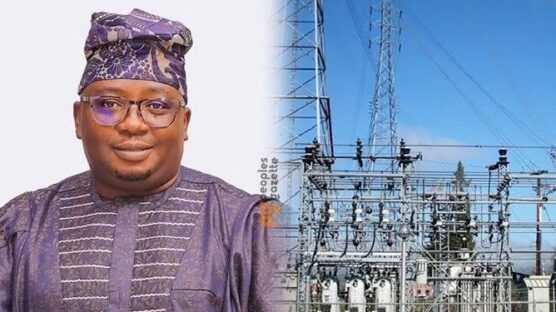

The Minister of Power, Mr Adebayo Adelabu says the Federal Government requires $10 billion investment yearly, to revive the power sector for the next 10 years.
Adelabu said this in Abuja on Monday, at a one day investigative hearing on halting the electricity tariff increase by the Nigerian Electricity Regulatory Commission (NERC) organised by the Senate Committee on Power.
“For this sector to be revived, the government needs to spend nothing less than 10 billion dollars annually in the next 10 years.
“This is because of the Infrastructure requirement for the stability of the sector, but the government cannot afford that.
“And so we must make this sector attractive to investors and to lenders.
“So for us to attract investors,and investment, we must make the sector attractive, and the only way it can be made attractive is that there must be commercial pricing,” he said.
Adelabu added, “If the value is still at N66 and the government is not paying subsidy ,the investors will not come.
“But now that we have increased the tariff for a Band, there is interest being shown by investors.”
The Minister said the major challenge in the sector was absence of liquidity, saying that the sector had been operating on a subsidised tariff regime, given the absence of a cost reflective tariff.
He said that the subsidy had not been funded over the years as huge liabilities were owed to the Generating Companies (GenCos) and the Gas Companies.
Adelabu said the inability of the government to pay the outstanding N2.9 trillion subsidy was due to limited resources, hence the need to evolve measures to sustain the sector.
He appealed to the lawmakers to support the process of paying the debt owed operators across the value chain of generation, transmission and distribution.
“The increase is based on supply, saying that any customer that does not receive 20 hours power supply will not be made to pay the new tariff,” he said.
He said the government was committed to ensuring sustainable reform in the sector, saying that there was a need to clear the outstanding debt owed to GenCos and Gas companies.
To improve power supply, he said the government was investing in hydro electric power, adding that construction of 700 mega watt power in Zungeru had commenced, while Kashimbila Hydroelectric power plant of 40 megawatt was awaiting evacuation to improve generation.
The Minister said there was also an ongoing investment of 26 small hydro power dams to boost electricity production across the country.
However, members of the committee in their separate remarks decried the experiences of Nigerians on electricity supply over the years, despite the unbundling of the sector.
Sen. Lola Ashiru, the Vice-Chairman of the committee said Nigerians were paying for inefficiency of power sector operators.
Ashiru said there was a lot of inefficiency across the value chain of generation, transmission and distribution..
He said poor Nigerians must be protected, adding that there was a need to consider a reversal of the tariff increase.
Sen. Solomon Larlong said there was no consultation before the increase, adding that issues of palliative should have been discussed and provided before the tariff increase.
The Chairman of the Committee, Sen. Enyinnaya Abaribe, said what Nigerians wanted was a solution to the issues and ways to ensure liquidity in the sector.
He also decried the non appearance of a company “ZIGLAKS” over the failed agreement to provide prepaid meters for Nigerians.
He alleged that the company had received N32 billion in 20 years to meter Nigerian electricity consumers.
Sen. Adamu Alero said due consultation was not made before the tariff increase.
He said the public was not at peace with the increase, saying that the increase was over 200 per cent, hence the need for a reversal of the tariff increase.
Business
Tribunal stops MultiChoice from increasing DStv, Gotv subscription rates


A Competition and Consumer Protection Tribunal (CCPT) sitting in Abuja, on Monday, restrained Multi-Choice Nigeria Limited from increasing its tariffs and cost of products and services scheduled to begin on May 1.
The three-member tribunal, presided over by Saratu Shafii, gave the interim order following an ex-parte motion moved by Ejiro Awaritoma, counsel for the applicant, Festus Onifade.
The tribunal, in a ruling, restrained Multi-Choice from going ahead with an impending price increase scheduled to take effect from May 1, pending the hearing and determination of the motion on notice filed before it.
“The 1st defendant is hereby restrained from taking any step(s) that may negatively affect the rights of the claimant and other consumers in respect of the suit pending the hearing and determination of the motion on notice,” Shafii declared.
She, therefore, directed all parties in the suit to appear before tribunal on Ma 7 at 10am for the hearing and determination of the motion on notice.
Onifade, in the suit marked: CCPT/OP/2/2024, had dragged Multi-Choice Nigeria Ltd and Federal Competition and Consumer Protection Commission (FCCPC) before the tribunal.
In the suit filed on April 29, Onifade, also a legal practitioner, sought two orders.
These include, “an order of interim injunction of this honourable tribunal restraining the 1st defendant whether by themselves, her privies, assigns by whatsoever name called from going ahead with impending price increase scheduled to take effect from 1st May, 2024, pending the hearing and determination of the motion on notice.
“An order restraining the 1st defendant from taking any step(s) that may negatively affect the rights of the claimant and other consumers in respect of the suit pending the hearing and determination of the Motion on Notice.”
Other members of the tribunal include Thomas Okosun and Dr. Umar Duhu.
Recall that the company had, on April 1, 2022, hike the prices of all its packages.
Business
DMO sells treasury bills worth N2.669trn in March — Report
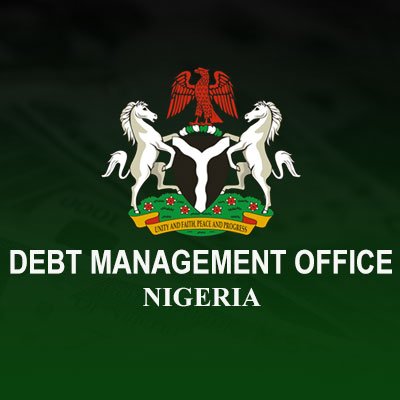

The Debt Management Office (DMO) sold Treasury Bills (T.bills) valued at N2.669 trillion across its auctions in March 2024.
This was contained in the FMDQ Markets Monthly Report for March seen by newsmen.
The amount represents a 3.07 percent (N79.54 billion) month-on-month (MoM) increase in the value of T-bills sold across auctions in February 2024 (N2.589 trillion).
Similarly, the DMO sold FGN Bonds worth N608.86 billion (inclusive of N133.20 billion non-competitive bids) via the issuance of a new three-year as well as the re-opening of a seven-year (7Y) and 10-year FGN bonds in March 2024.
The report noted that the total sale represents a 35.30 percent oversubscription of the amount offered and a 59.27 percent (N886.05 billion) MoM decrease on the amount sold in February 2024 (N1.494 trillion) across the 7Y and 10Y FGN bond maturities.
In March 2024, the CBN sold open market operations (OMO) bills worth N1,056 trillion at auction in the primary market.
According to the report, there were no new listings of non-sovereign bonds on the FMDQ Exchange in March 2024.
“However, Corporate bonds worth N15.00 billion matured and were redeemed resulting in a 0.68 percent (N15.00 billion) MoM decrease in the value of Non-Sovereign Bonds outstanding to N2.194 trillion in March 2024,” it said.
The report stated that the total value of commercial papers (CPs) quoted on the FMDQ Exchange in March 2024 was N112.62 billion, representing a MoM increase of 123.76 percent (N62.29 billion) from the value of CPs quoted in February 2024.
“Quoted CPs were issued by institutions from various sectors including Financial Services (10), Manufacturing (4), Retail (2), Health & Pharmaceuticals (1), Agriculture (1), Technology (1), and Chemical Supply & Oil Field Service (1). However, N39.26 billion CPs matured and were redeemed resulting in a 9.28 percent (N73.36 billion) MoM increase in the total outstanding value to N864.11 billion in March 2024,” it said.
…Secondary market turnover
According to the report, secondary market turnover on FMDQ Exchange in March 2024 was N48.87 trillion, representing a MoM and YoY increase of 21.22 percent (N8.55 trillion) and 100.67 percent (24.51 trillion) from February 2024 and March 2023 figures, respectively.
Foreign exchange (FX) and money market (MM) transactions dominated secondary market activity, jointly accounting for 75.36 percent of the total secondary market turnover in March 2024.
-
capital market2 years ago
Rt.briscoe, FBNH, Others halts negative performance of stock market
-
Finance3 months ago
Court orders Sen. Victor Umeh to repay N136m bank debt to AMCON
-



 Abuja Update2 months ago
Abuja Update2 months agoUNDP, FG partnership needed to achieve inclusion, equity- Minister
-
Abuja Update1 month ago
Banks drive stock market performance with N147bn gain
-



 Health2 weeks ago
Health2 weeks agoCapacity training will reduce migration of health workers- NPHCDA
-



 Business1 week ago
Business1 week agoTingo Group unveils Tingo Electric, Tingo Cola drink at Lagos launch
-



 Infotech4 weeks ago
Infotech4 weeks agoWorld Backup Day: NITDA urges Nigerians to ensure backup of data
-
News4 months ago
Oil thieves sponsoring malicious media campaign against Navy – Spokesman

